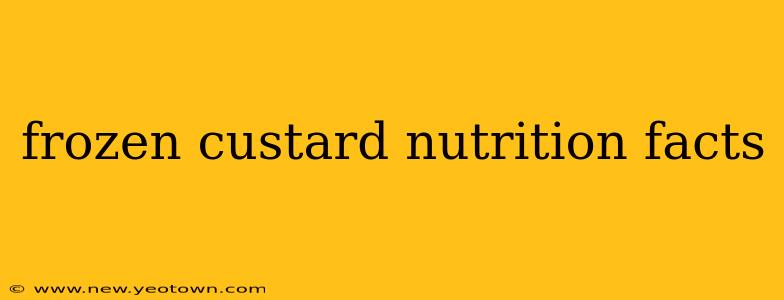Ah, frozen custard. That rich, creamy, decadent treat that somehow manages to be both intensely satisfying and slightly guilt-inducing. But just how nutritious – or unnutritious – is this frozen delight? Let's dive into the creamy depths and explore the nutritional facts surrounding frozen custard. It's a journey that will leave you better informed about this beloved dessert.
The truth is, there's no single answer to the question of frozen custard's nutritional content. The nutritional profile varies wildly depending on the specific recipe, the ingredients used, and the serving size. Think of it like this: a simple vanilla frozen custard will have a different nutritional breakdown than a chocolate peanut butter swirl concoction loaded with mix-ins.
What are the key nutritional components of frozen custard?
Frozen custard, at its heart, is a blend of cream, milk, eggs, and sugar. This combination contributes to its characteristic richness and creamy texture. Consequently, the main nutritional components will include:
- Fat: The high cream and egg yolk content contributes significantly to the fat content. This is where a significant portion of the calories comes from.
- Sugar: Sugar is a key ingredient, adding sweetness and influencing the overall calorie count. The amount of added sugar can vary tremendously based on the recipe and the addition of sauces or toppings.
- Protein: The eggs and milk contribute a moderate amount of protein.
- Calcium: Milk and cream are good sources of calcium.
- Vitamins and Minerals: The exact vitamins and minerals will depend on the ingredients used, but you can expect some vitamins A and D from the dairy.
How many calories are in frozen custard?
This is the question on many minds! The calorie count per serving can range drastically. A small serving of plain frozen custard might contain anywhere from 200 to 300 calories, while larger servings or those with added toppings (like chocolate sauce, nuts, or candies) can easily surpass 500 calories. Always check the nutritional information provided by the specific vendor or restaurant.
Is frozen custard healthier than ice cream?
This is a complex question without a simple yes or no answer. While some might argue that frozen custard's egg yolks add nutritional value in the form of protein and fat-soluble vitamins, the higher fat and sugar content generally mean that it’s not significantly healthier than ice cream. The calorie and fat content are often quite similar, even if the nutritional profile differs slightly. The key difference lies in the texture and richness, which many find more satisfying in smaller portions.
What are some healthier ways to enjoy frozen custard?
If you're looking to indulge in a more mindful way, consider these options:
- Choose smaller portions: This is the easiest way to control your calorie intake.
- Opt for simpler flavors: Avoid those loaded with extra sugar and calories from mix-ins. Plain vanilla or a simple fruit flavor will generally have a lower calorie count.
- Share with a friend: Sharing a larger serving cuts down on your individual consumption.
- Make your own: This gives you complete control over the ingredients and the amount of sugar.
Can I eat frozen custard if I'm on a diet?
The short answer is: it depends on your dietary goals and your overall calorie intake. If you're mindful of portion sizes and incorporate frozen custard as an occasional treat within your daily caloric limits, it can likely fit into a healthy diet. However, it's not something you should consume regularly if weight management is a primary goal.
Ultimately, the nutritional value of frozen custard lies within the context of your overall diet and lifestyle. Enjoy it responsibly, and savour each bite! Remember that moderation is key to a balanced approach to enjoying your favorite treats.

